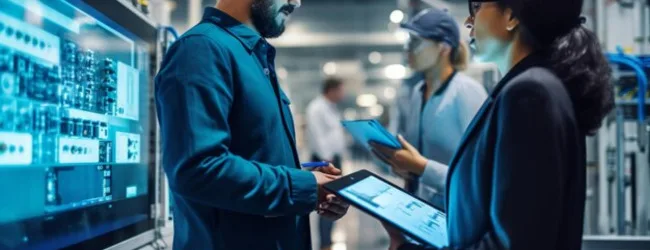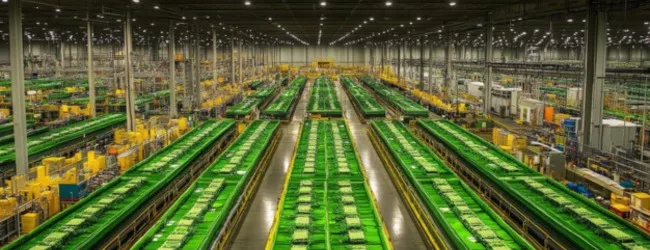Table of contents
- Why Start a Battery Manufacturing Business?
- 1. Market Research and Feasibility Study
- 2. Business Plan Development
- 3. Legal and Regulatory Compliance
- 4. Infrastructure and Manufacturing Setup
- 5. Funding and Financing
- 6. Marketing and Sales Strategy
- 7. Operational Management and Growth
- Conclusion
- Frequently Asked Questions (FAQs)
The demand for batteries is surging in India, driven by the rise of electric vehicles (EVs), renewable energy storage, and consumer electronics. Starting a battery manufacturing business can be a lucrative venture if approached strategically. This guide provides a step-by-step roadmap to help you navigate this exciting industry.
Why Start a Battery Manufacturing Business?
The decision to embark on a battery manufacturing venture in India isn’t just a business move; it’s a strategic alignment with the nation’s ambitious energy transformation. Here’s a breakdown of the powerful “why” behind this compelling opportunity:
- Surging Demand, Untapped Potential:
- India’s electric vehicle (EV) market is witnessing explosive growth, fueled by government initiatives like FAME II and increasing consumer awareness. This translates to an insatiable demand for high-quality batteries.
- Beyond EVs, the renewable energy sector, particularly solar and wind, requires robust energy storage solutions. As India pushes towards its renewable energy targets, the need for efficient battery storage will soar.
- The consumer electronics market, with its ever-growing demand for smartphones, laptops, and other devices, provides a stable and expanding market for batteries.
- Highlight: India is a massive market, with a huge growth potential, and currently the battery manufacturing is not able to keep up with the demand.
- Government Support and Incentives:
- The Indian government is actively promoting battery manufacturing through initiatives like the Production Linked Incentive (PLI) scheme for Advanced Chemistry Cell (ACC) battery storage. This 1 offers substantial financial incentives to manufacturers.
- Policies aimed at reducing carbon emissions and promoting sustainable energy solutions create a favorable environment for battery manufacturing.
- Government support reduces financial risk and provides a stable, predictable market.
- Technological Advancement and Innovation:
- The battery technology landscape is constantly evolving, with advancements in lithium-ion, solid-state, and other technologies.
- Starting a battery manufacturing business provides an opportunity to be at the forefront of this technological revolution, driving innovation and developing cutting-edge products.
- Highlight: Investing in R&D can create a competitive advantage and ensure long-term sustainability.
- Sustainable and Green Future:
- Battery manufacturing plays a crucial role in enabling the transition to a sustainable and green future.
- By providing energy storage solutions for renewable energy sources and powering electric vehicles, battery manufacturers contribute to reducing carbon emissions and mitigating climate change.
- Contributing to a cleaner environment is not only socially responsible but also a sound business strategy, as consumers increasingly prioritize sustainable products.
- Economic Growth and Job Creation:
- Establishing a battery manufacturing plant creates numerous jobs, from skilled labor to engineering and management positions.
- This contributes to local and national economic growth, boosting the manufacturing sector and reducing reliance on imports.
- Highlight: This industry helps in the development of the Indian manufacturing sector.
- Reduced Import Dependency:
- India is currently heavily reliant on imports for its battery needs. Domestic production can significantly reduce this dependency, strengthening the nation’s energy security and reducing trade deficits.
- By establishing a robust domestic battery manufacturing industry, India can gain greater control over its energy supply chain.
- Strategic Advantage:
- Being an early entrant into the large scale battery manufacturing market in India, gives a company a strategic advantage over future competitors.
- Creating strong business relationships and establishing a brand name early on, helps to create a strong business foundation.
Here’s How to start your Battery Manufacturing Business
1. Market Research and Feasibility Study

- Detailed Market Understanding:
- Specific Battery Types:
- Lithium-ion Batteries: Dominant in EVs and portable electronics, offering high energy density. Understand the specific chemistries (LFP, NMC, etc.) and their applications.
- Lead-Acid Batteries: Mature technology, used in automotive and industrial applications. Analyze the demand for maintenance-free and advanced lead-acid batteries.
- Solar Batteries: Growing demand for energy storage in solar power systems. Study the market for residential, commercial, and utility-scale solar storage.
- Nickel-Metal Hydride (NiMH) Batteries: Used in hybrid vehicles and some consumer electronics. Assess niche market opportunities.
- Market Size and Growth Trends:
- EV Battery Market: India’s EV market is experiencing rapid growth, driven by government policies and increasing consumer awareness. Research the projected growth rates and market share of different EV segments.
- Renewable Energy Storage: The increasing adoption of solar and wind energy is driving demand for energy storage solutions. Analyze the growth of grid-scale and off-grid storage markets.
- Consumer Electronics: The demand for batteries in smartphones, laptops, and other devices remains significant. Study the trends in consumer electronics and the demand for high-performance batteries.
- Industrial Applications: Batteries are used in various industrial applications, including telecommunications, data centers, and backup power systems. Analyze the specific requirements of these industries.
- Competitive Landscape:
- Identify key players in the Indian battery market, including domestic and international companies.
- Analyze their market share, product offerings, and pricing strategies.
- Identify potential competitive advantages, such as innovative technology, cost-effectiveness, or superior quality.
- Specific Battery Types:
- Detailed Feasibility Study:
- Technical Feasibility:
- Assess the availability of technology and expertise for battery manufacturing.
- Evaluate the complexity of the manufacturing process and the required technical skills.
- Analyze the availability of raw materials and the feasibility of sourcing them locally.
- Financial Feasibility:
- Develop a detailed financial model, including startup costs, operating expenses, and revenue projections.
- Analyze the profitability of the business and the return on investment.
- Assess the financial risks and develop mitigation strategies.
- Operational Feasibility:
- Evaluate the availability of infrastructure, including land, buildings, and utilities.
- Assess the availability of skilled labor and the feasibility of training programs.
- Analyze the logistics and supply chain management requirements.
- Technical Feasibility:
ALSO READ | Start Real Estate Business With Zero Investment in 8 Simple Steps
2. Business Plan Development
- Detailed Business Plan Components:
- Executive Summary: A concise overview of your business, highlighting key points.
- Company Description: Your company’s mission, vision, and core values.
- Market Analysis: In-depth analysis of your target market, competitors, and market trends.
- Products and Services: Detailed description of your battery products and any related services (e.g., recycling, maintenance).
- Marketing and Sales Strategy: Your plan for reaching customers and generating sales, including pricing, promotion, and distribution.
- Operations Plan: Details of your manufacturing process, supply chain, and quality control.
- Financial Plan: Financial projections, including income statements, balance sheets, and cash flow statements.
- Legal and Regulatory Compliance: Outline of all required licenses, permits, and certifications.
- Management Team: Information about your management team and their experience.
- Risk Assessment: Identification of potential risks and mitigation strategies.
- Appendix: Supporting documents, such as market research reports and financial statements.
3. Legal and Regulatory Compliance
- Detailed Legal and Regulatory Considerations:
- Business Registration:
- Choose the appropriate business structure (sole proprietorship, partnership, private limited company).
- Register your business with the Registrar of Companies (ROC).
- Environmental Clearances:
- Obtain environmental impact assessments (EIAs) and clearances from the State Pollution Control Board.
- Comply with regulations related to air and water pollution, waste management, and noise control.
- BIS Certification:
- Ensure your batteries meet the BIS quality standards for safety and performance.
- Obtain the necessary certifications and licenses from the BIS.
- GST Registration:
- Register for GST to comply with indirect tax regulations.
- Factory License:
- Obtain a factory license from the relevant state government authority, which may involve inspections and approvals.
- Hazardous Waste Management:
- Implement proper hazardous waste management procedures, especially for lead-acid battery manufacturing.
- Comply with regulations related to the storage, transportation, and disposal of hazardous waste.
- Business Registration:
💡 Pro Tip: If you want to start a Manufacturing Business but have too many doubts, connect with a Manufacturing Business expert from Boss Wallah for guidance – https://bw1.in/1116
4. Infrastructure and Manufacturing Setup

- Detailed Infrastructure and Manufacturing Considerations:
- Land and Building:
- Secure appropriate land with adequate space for manufacturing, storage, and administrative facilities.
- Design the building to meet safety and environmental standards.
- Machinery and Equipment:
- Invest in high-quality machinery and equipment to ensure efficient and reliable production.
- Consider automation and robotics to improve productivity and reduce labor costs.
- Raw Material Sourcing:
- Establish reliable and cost-effective sources for raw materials.
- Develop a supply chain management system to ensure timely delivery of materials.
- Quality Control:
- Implement a comprehensive quality control system to ensure product quality and consistency.
- Invest in testing equipment and establish quality control procedures at every stage of the manufacturing process.
- Land and Building:
5. Funding and Financing
- Detailed Funding and Financing Strategies:
- Personal Investment:
- Use your own savings and assets to fund the initial stages of the business.
- Bank Loans:
- Explore loan options from banks and financial institutions, including term loans, working capital loans, and equipment loans.
- Government Schemes:
- Leverage government schemes like MSME loans, Startup India initiatives, and the PLI scheme for ACC battery storage.
- Research and apply for relevant grants and subsidies.
- Venture Capital and Private Equity:
- Seek funding from venture capitalists and private equity firms for growth and expansion.
- Develop a compelling pitch deck and business plan to attract investors.
- Personal Investment:
6. Marketing and Sales Strategy
- Detailed Marketing and Sales Strategies:
- Target Market:
- Clearly define your target market and understand their needs and preferences.
- Branding and Marketing:
- Develop a strong brand identity and marketing strategy to create awareness and build customer loyalty.
- Use a mix of traditional and digital marketing channels to reach your target audience.
- Distribution Channels:
- Establish efficient distribution channels, including distributors, retailers, online platforms, and direct sales.
- Customer Service:
- Provide excellent customer service to build long-term relationships and generate repeat business.
- Digital Marketing:
- Utilize SEO, Social Media Marketing, Content Marketing, and Online Advertising.
- Target Market:
ALSO READ | Start an Online Marketing Home based Business : Step-by-Step Guide for 2025
7. Operational Management and Growth

- Detailed Operational Management and Growth Strategies:
- Supply Chain Management:
- Optimize your supply chain for efficiency and cost-effectiveness.
- Implement inventory management systems and logistics solutions.
- Human Resources:
- Hire skilled workers and provide ongoing training.
- Develop a strong company culture and employee engagement programs.
- Research and Development:
- Invest in R&D to innovate and improve your products.
- Stay up-to-date with the latest technologies and trends in the battery industry.
- Expansion:
- Plan for future expansion and growth, including expanding production capacity, entering new markets, and developing new products.
- Supply Chain Management:
Need Expert Guidance?
Starting a business can be challenging, but you don’t have to do it alone! At Boss Wallah, our 2,000+ business experts are ready to provide valuable insights and guidance. Whether you need help with marketing, finance, sourcing, or any other area of any business, our business experts are here to help you succeed- https://bw1.in/1116
Confused about Which Business to Start?
Want to start your own business but unsure which one to choose? Explore Boss Wallah, where you’ll find 500+ courses by successful business owners, featuring practical, step-by-step guides on starting and growing various businesses. Find your perfect business idea today – https://bw1.in/1111
Conclusion
Starting a battery manufacturing business in India requires careful planning, execution, and adherence to regulatory requirements. By conducting thorough market research, developing a robust business plan, and securing adequate funding, you can capitalize on the growing demand for batteries and build a successful enterprise.
Frequently Asked Questions (FAQs)
1 . What is the initial investment required to start a battery manufacturing business in India?
- The investment varies depending on the scale and type of battery manufacturing. It can range from a few crore rupees for small-scale operations to hundreds of crores for large-scale plants.
2 . What are the key licenses and permits required?
- Business registration, environmental clearances, BIS certification, GST registration, and a factory license.
3 . What are the main raw materials used in battery manufacturing?
- Lithium carbonate, lead, electrolytes, and other chemical components.
4 . How can I secure funding for my battery manufacturing business?
- Personal investment, bank loans, government schemes, and venture capital.
5 . What are the government incentives available for battery manufacturing in India?
- MSME loans, Startup India initiatives, and PLI scheme for ACC battery storage.
6 . What is the market potential for battery manufacturing in India?
- The market is growing rapidly, driven by the increasing adoption of EVs and renewable energy.
7 . What are the key challenges in the battery manufacturing industry?
- High initial investment, raw material sourcing, and regulatory compliance.
8 . How important is quality control in battery manufacturing?
- Extremely important. Quality control ensures product safety, performance, and customer satisfaction, and is required for BIS certifications.


